
National Interest Foundation Event Recap
Sudan War and Foreign Meddling
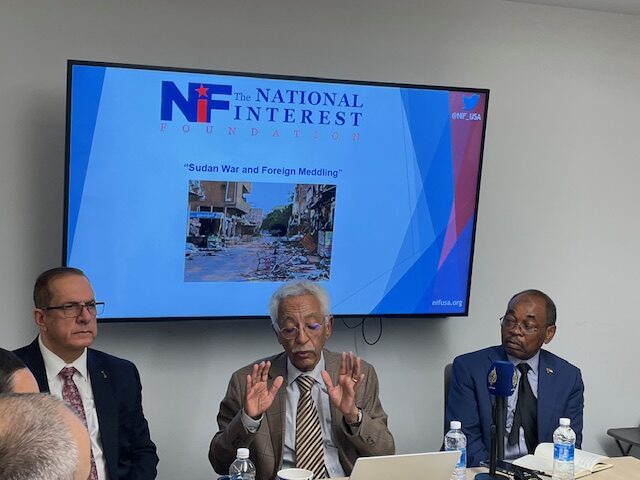
Last Thursday, November 6th, the National Interest Foundation (NIF) hosted an event titled “Sudan War and Foreign Meddling” regarding the latest developments surrounding the war in Sudan and the foreign meddling in the conflict. The distinguished event speakers were H.E. Mohamed Abdalla Idris, the Ambassador of Sudan to the United States and H.E. Dr. Khidir Haroun Ahmed, the former Ambassador of Sudan to the United States who is currently Associate Professor of Political Science at the International University of Africa. The discussion was moderated by Khaled Saffuri, President of NIF.
The timely event sought to address the recent massacre of civilians in El Fasher by the Rapid Support Forces (RSF) and the destructive role that foreign entities such as the United Arab Emirates (UAE) have played in funding and arming the RSF. UN experts, U.S. intelligence agencies, and human rights organizations have all long documented how the UAE has funneled weapons to the RSF via neighboring countries like Chad, Uganda, and Libya. The UAE’s support of the RSF is driven by its economic interests in resource-rich Sudan, particularly its vast gold and agricultural resources. The RSF’s leader, Mohamed Hamdan Dagalo (Hemedti), and his family have profited from Sudan’s gold trade, with significant amounts being smuggled to Dubai. Additionally, the UAE has desired to gain control over strategic Red Sea ports in Sudan. Reports have even indicated that the UAE has used humanitarian aid shipments as a cover for arms smuggling, with the UAE publicly calling for a ceasefire as an attempt to try and mask its military support and mitigate damage to its international standing and reputation. Yet all told, while many analysts have sought to maintain focus and grown increasingly vocal in their condemnation of external interference in Sudan, the global community has failed to take adequate measures.
After an 18-month siege, the RSF seized control of El Fasher in late October and carried out an unspeakable massacre of thousands of civilians. Witnesses and human rights groups shed light on the mass killings, widespread sexual violence, and torture which also saw tens of thousands who were able to flee the carnage escape to overcrowded refugee camps, where humanitarian conditions are extremely dire. The RSF atrocities included the targeting of hospitals and medical facilities where hundreds of patients and staff were killed. Analysis of satellite imagery by the Yale School of Public Health’s Humanitarian Research Lab (such as the one below) revealed evidence of mass graves at massacre sites, with blood and piles of dead bodies being visible from space, demonstrating the scale of unprecedented slaughter. Even prior to the massacre, the 18-month-long siege had resulted in a catastrophic humanitarian crisis, with civilians suffering from extreme shortages of food, water, medicine, and other vital supplies. The UN Human Rights Council has scheduled a special session on Sudan for November 14th, and the International Criminal Court (ICC) has launched an investigation into RSF war crimes and crimes against humanity. Still, to date, the global community has faced significant criticism for its largely passive and indifferent approach to the major crisis in Sudan, as various aid organizations and observers point out that words have not translated into effective action and that a stronger and more decisive response is urgently needed to prevent further atrocities.
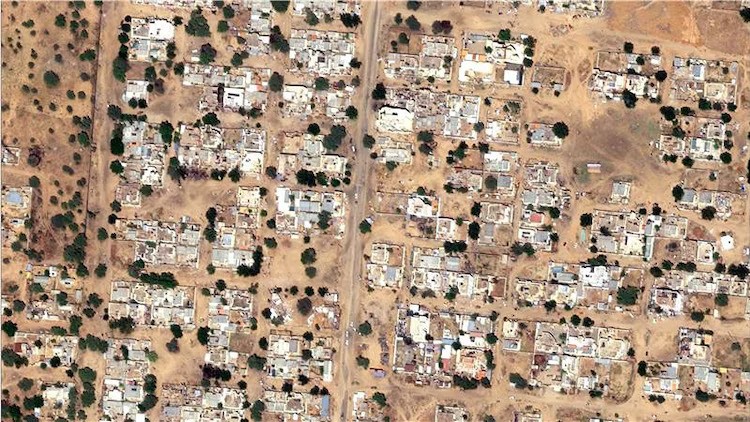
A recent report released by the Integrated Food Security Phase Classification Partnership (IPC) – a snapshot of which is below – documented that famine is persisting in Sudan and that it remains the world’s largest hunger and displacement crisis, with over 21 million people in urgent need of humanitarian assistance and nearly 10 million displaced internally. A significant portion of the internal displacement is concentrated in the region of Darfur, with North Darfur in particular experiencing a sharp increase in internally displaced people this year. Starvation is also especially severe in locations where the RSF has obstructed civilian movement and humanitarian access, with the recent atrocities in and around El Fasher in North Darfur highlighting the severity of the human rights violations and war crimes being committed. The United Nations estimates that at least 2,500 civilians have been executed in El Fasher since the RSF takeover there on October 26th, but experts contend that the total number is likely much higher given the current inability to assess the full scale of the violence there. Furthermore, it is believed that 82,000 civilians or more of the city’s total population were forced to flee, with many others still trapped. In addition to El Fasher, several other areas – including Kadugli and Dilling in South Kordofan – are also of critical concern as they continue to face sieges and alarming levels of violence.
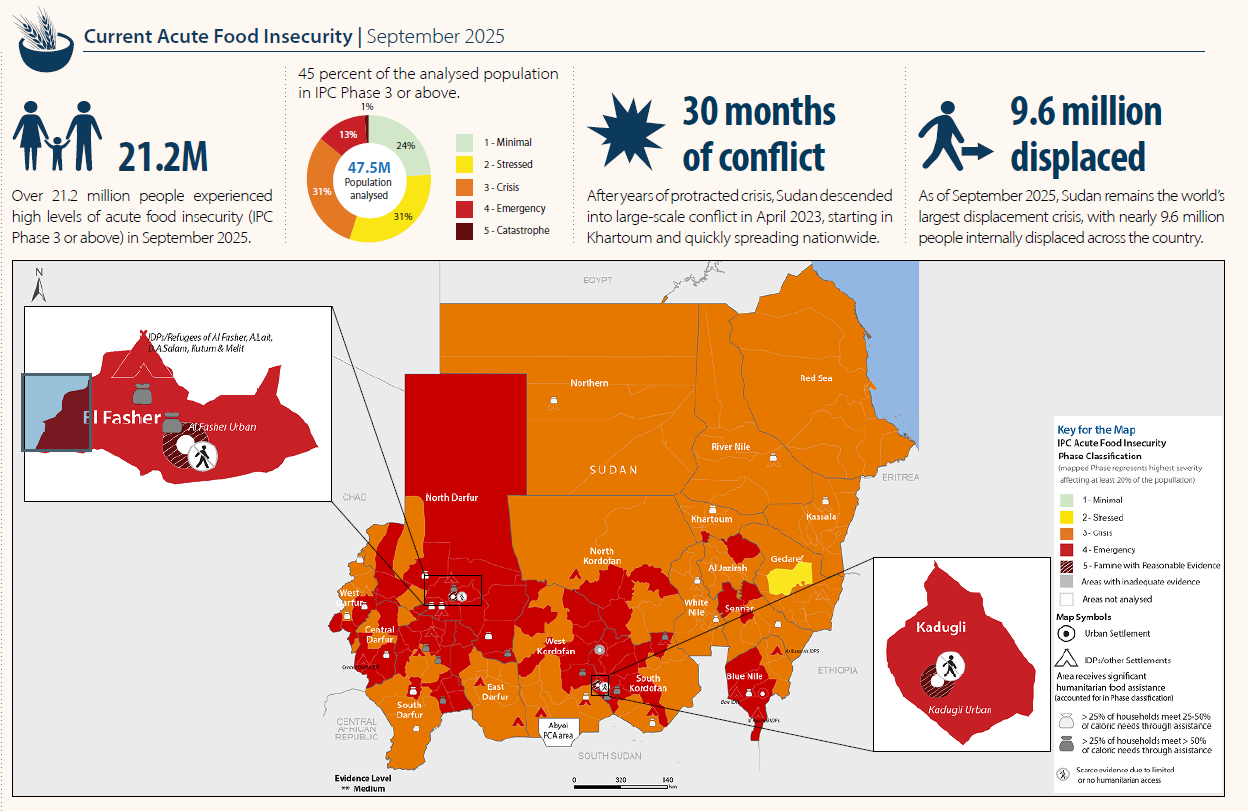
During last Thursday’s NIF event, the speakers discussed how the ongoing conflict in Sudan has been taking place for over two and half years, yet prior to the recent massacre, it has not received the adequate attention it warrants given the scale of the violence and the humanitarian crisis it has created. H.E. Mohamed Abdalla Idris, the Ambassador of Sudan to the United States, spoke regarding the importance of the international media in drawing attention to the atrocities taking place. He outlined how the RSF is a barbaric and brutal force which grew out of the Janjaweed over a decade ago, and how it is committing genocide and mass killings now as it did back in the early 2000s in Darfur. H.E. Idris highlighted those that the RSF is targeting and their disturbing efforts to kill natives and replace them with outsiders tied to their group. The Ambassador also discussed how alarmingly, the scale of the mass RSF atrocities is undoubtedly even greater than what is currently known, since there are still discoveries to be uncovered later. Furthermore, he cited the need to designate the RSF as a terrorist group and stop its enablers, namely the UAE.
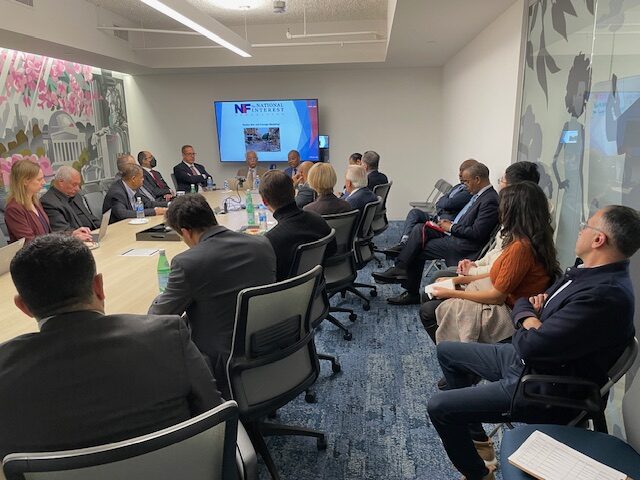
H.E. Dr. Khidir Haroun Ahmed, the former Ambassador of Sudan to the United States who is currently Associate Professor of Political Science at the International University of Africa, then proceeded to speak about the scale of the atrocities in Sudan. He also lamented the erroneous narrative that what is taking place in Sudan is a “civil war” and instead pointed out how it is an aggression led by the UAE against Sudan with the tacit approval of other regional actors and the international community to reshape the country and exploit its resources. H.E. Haroun Ahmed discussed some of the historical background of Sudan, as well as its vast array of natural and agricultural resources. Due to this, he contended that foreign powers and intervening forces have regrettably always sought to shape the trajectory of Sudan.
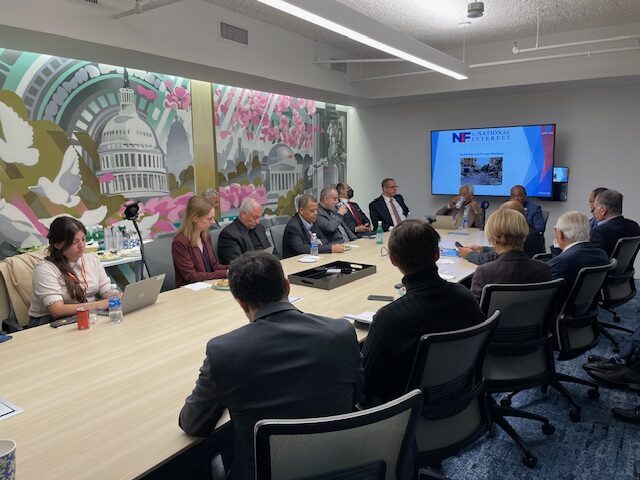
In the Q&A session following the speakers’ remarks, H.E. Mohamed Abdalla Idris emphasized the destructive role that outside forces have always played in Sudanese affairs. He also echoed the concern brought up about how sanctioned RSF officials have been allowed to engage in diplomatic discussions here in the United States and expressed that he does not have any details on why this has been allowed to happen. The speakers responded to a question regarding the role of Egypt and Saudi Arabia in addressing the crisis in Sudan, stating that they have both played a positive part in alleviating this by taking in refugees displaced as a result of the ongoing conflict. They also talked about the fact that Libyan warlord Khalifa Haftar, who like the RSF in Sudan has been supported by the UAE, is a destabilizing force in the region that is fueling continued conflict, fragmentation, and instability as well. Lastly, it was stressed that the ongoing conflict has seen the RSF unleash violence and mass killing against the people of Sudan and that as such, the Sudanese state and its armed forces have been well within their right under international law to try to protect and defend the country and its citizens from this.
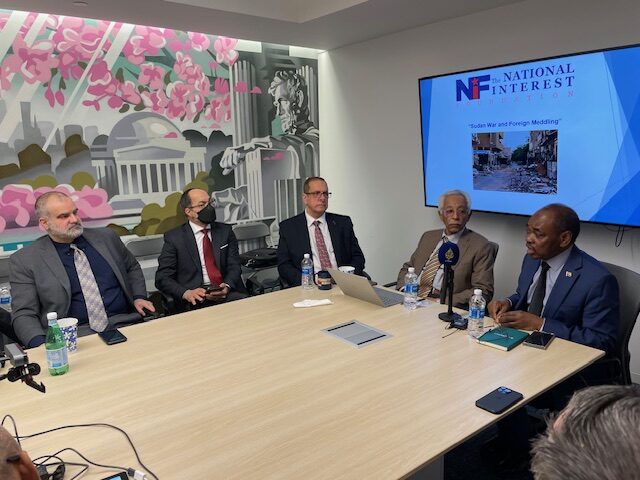
To watch the entire event on our YouTube page, please click here.
